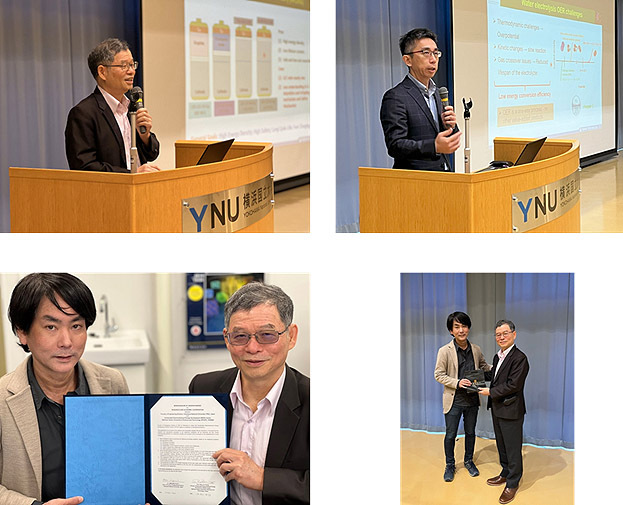
▌International Collaboration : International Collaboration in Research

The center's team members actively engage in international collaborations with various institutions, including the University of Münster in Germany, Juelich Research Center (IEK-1), Dresden University of Technology (TU Dresden), Uppsala University in Sweden, Stanford University and the University of California, San Diego in the United States, Kyoto University and Tokyo Institute of Technology in Japan, the National Institute of Materials (NIMs) in Japan, Hokkaido University, École polytechnique and the University of Bordeaux in France, and the Russian Academy of Science. Below are brief introductions to two collaborative teams.

University of Münster
Foreign University: University of Münster (MEET - Münster Electrochemical Energy Technology)
Professor Martin Winter, director of the MEET center at the University of Münster, is a member of the German Academy of Sciences and Engineering. He plays a leading role in battery science research in Germany and is a key driver of rapid developments in battery technology. The center has collaborated with MEET for many years, jointly executing the Taiwan-Germany bilateral project "LiBEST - Development of High-Efficiency and High-Safety Lithium-Ion Battery Technology" for five years. Several center members have actively participated in the project. Additionally, they collaborated on the European Union's nanomaterials project (M.ERA-NET) Achilles, focusing on the development of novel stable lithium-sulfur and lithium-silicon high-energy batteries. Over the years, the collaboration has deepened, resulting in over 120 published SCI journal papers and more than 13 jointly authored articles. The collaboration has also attracted over 20 industry partners, including ITRI, Lite-On Power System, Qnovo, Nanya Plastics, BenQ, Energy Absolute, Evonik, Polyplus, and more.

© University of Uppsala
Foreign University: Uppsala University in Sweden
Professor Kristina Edström, a leading scientist in batteries at Uppsala University, is a member of the Royal Swedish Academy of Sciences and currently leads the EU BATTERY 2030+ large-scale research initiative. Center team members, including Professor Huang Bing-Chao, Professor Su Wei-Nien, Professor Jiang Zhi-Qiang, and Professor Chen Shi-Yun, are involved in the Taiwan-Germany bilateral project "Solid Alibi." The collaboration aims to develop and utilize in-situ SEM and in-situ TEM techniques with an anode-free battery structure to directly observe lithium metal deposition and dendrite growth. The collaboration has included visits and exchanges between the two teams, with future meetings planned.
EU International Collaboration
The current lithium-ion battery (LIB) technology has reached its limits, necessitating a high-performance energy storage device. Lithium metal batteries are considered the most promising concept to increase energy density and subsequently improve the range of electric vehicles. The lithium metal anode is a crucial component of the next-generation battery. In the EU collaboration project, the goal is to develop a stable lithium metal anode using mass-production processes. The technology developed in this project will establish a universal platform for lithium metal anode processing in collaboration with Germany's Fraunhofer, TU Dresden, Belgium's VITO, MPG, and the SEED center for both liquid and solid battery chemistry.

EU Project Industry-Academia Collaboration
Yokohama National University
SEED center professors Huang Bing-Chao and Su Wei-Nien were invited to speak at the 2023 ACERC International Symposium held at Yokohama National University (YNU). They shared the latest research trends on anode-free batteries and high-value-added hydrogen production. Following the symposium, representatives from the SEED center signed an academic research MOU with Yokohama National University, covering the exchange of scholars and students, joint research projects, workshops, assistance in bilateral industrial development, and other academic research activities. Through the SEED center, this collaboration will contribute to strengthening the academic and industrial ties between Taiwan and Japan.

Image: Professor Bing Joe, Hwang and Professor Wei-Nien, Su representing SEED center signing a battery research MOU with Yokohama National University.
https://ias.ynu.ac.jp/ennews/1979/




